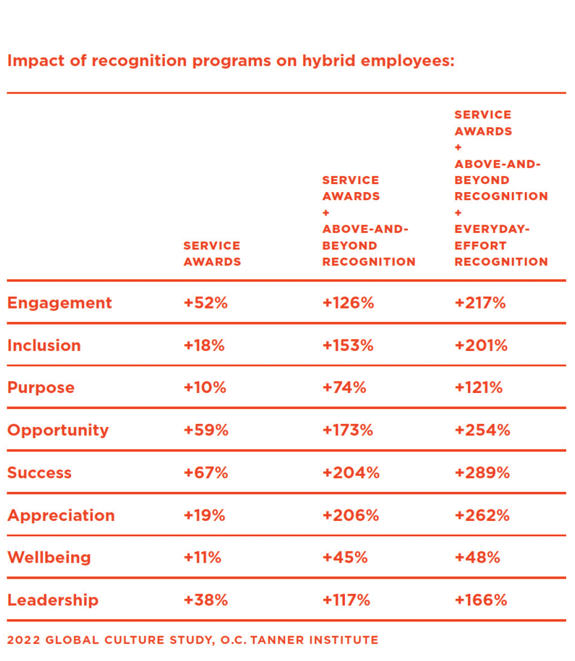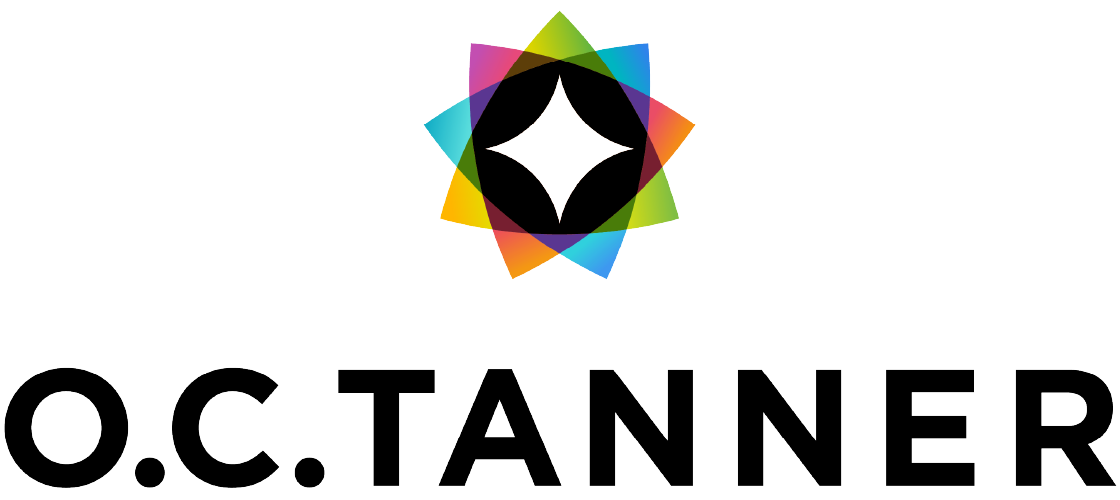
Why Employees Leave. 4 Ways Recognition Can Slow Resignation.

Author: Carlee Sawyer, Managing Director, Western Canada, O.C. Tanner
The truth is many employees aren’t leaving their jobs for a similar job with better pay. They are leaving for completely different careers that give them more control and flexibility over their lives. McKinsey finds that while employers think better pay and benefits will attract and keep their people, what employees really want from their companies is to feel valued, a sense of belonging, control over their careers, and flexibility and autonomy in their jobs.
Flexibility in when, where, and how employees do their work. Research from the 2022 Global Culture Report indicates that some tasks are easier to do at home, while others are better done in the office. When employees have schedule and location flexibility, there is a 77% increase in retention and 41% increase in engagement.
Employees also want more control over their work and careers. Autonomy includes an increased sense of ownership and more say in the projects they work on, the type of work they do, and how that work gets done.
Harvard Business Review reports that true flexibility at work is conditional upon employees’ ability to “exercise it in a way that best fits them. In other words, it’s conditional upon autonomy.” Flexibility and autonomy, according to the research, go hand in hand.
Just as organizations learned to accommodate remote work during the pandemic, they must now adjust to accommodate employee needs for even more flexibility and autonomy.
Four Ways Employee Recognition Helps
1) RECOGNITION HELPS REMOTE EMPLOYEES STAY CONNECTED.
Employees who have strong connections at work have better experiences, do more great work, and are less likely to experience burnout. The best workplaces use frequent employee recognition to connect employees to purpose, accomplishment, and one another. Recognition connects employees to purpose by affirming how their great work contributes to and furthers the organization’s mission.
It also celebrates employee accomplishments and connects them to the company’s success. And recognition builds connections between givers and receivers, helping to build strong team connections and ensuring that they feel seen and know they belong.
More recognition leads to more connection. Recognition for everyday efforts, above and beyond accomplishments, and career milestones leads to higher engagement, feelings of inclusion, and better wellbeing.




2) RECOGNITION INCREASES FEELINGS OF BELONGING.
Recognition, when done well, shows employees they are valued as an individual for their unique contributions and bringing their whole selves to work. It demonstrates that they are an integral part of and belong on the team and at your organization.
Meaningful recognition builds belonging and inclusion by ensuring that all employees feel like they fit in the organization, are appropriately utilized, and valued, and are welcomed in every setting. No matter where employees are working from, even if they aren’t physically together, recognition can bridge the distance gaps and help them feel they are part of the team.
When recognition is an integrated part of an organization’s culture, employees are:
- 4x more likely to feel high inclusion
- 22% less likely to feel high exclusion
- 13x more likely to feel they belong at the organization
And when companies celebrate successes together, employees are 20X more likely to feel connected and want to stay.
3) RECOGNITION HELPS WITH CAREER DEVELOPMENT.
In the new flexible workplace, companies need a robust strategy for career development. For hybrid employees, career development is crucial to a successful employee experience.
Recognition showcases the great work and careers of all employees, not just those in the office. It highlights employee accomplishments and skills to others across the organization, paving the way for opportunities to network, work on special projects, and develop skills.
And it builds a sense of ownership, expertise, and autonomy. By recognizing small wins and efforts along the way, leaders see an 83% increase in engagement and a 136% increase in employees feeling like a subject matter expert at their organization.
4) RECOGNITION REINFORCES OWNERSHIP OF WORK AND BUILDS AUTONOMY.
It shows employees have taken the lead, innovated, and did something great on their own. Recognition calls out and rewards autonomous actions that lead to success.
Give employees autonomy and provide a flexible program so they can give recognition for whatever great work they see, from wherever they are. Empower them to own the recognition experience, without unnecessary approvals, and personalize each recognition moment for the recipient. Integrate recognition into your company culture so employees can easily recognize and be recognized for their work.
Recognition increases the likelihood of autonomy satisfaction by 225%
– 2022 GLOBAL CULTURE REPORT, O.C. TANNER INSTITUTE
Recognizing and appreciating great work creates a thriving culture so employees, no matter where they are working from, feel valued and want to stay.
|
|
O.C. Tanner is the global leader in software and services that improve workplace culture through meaningful employee recognition experiences. Learn more at octanner.com . |
The views and opinions expressed in this blog post belong solely to the original author(s) and do not necessarily represent the views and opinions of CPHR Alberta.
The views and opinions expressed in this blog post belong solely to the original author(s) and do not necessarily represent the views and opinions of CPHR Alberta.






